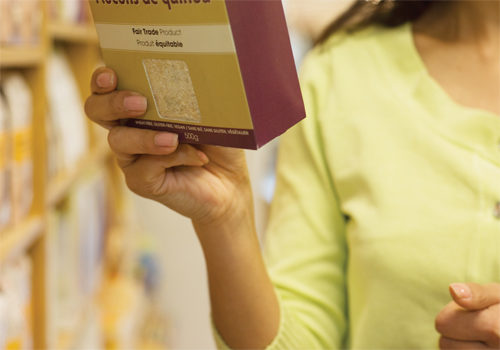According to the Natural Marketing Institute (NMI), over 400 registered green logos exist worldwide (1). Most consumers say they are more likely to buy products with green seals, says NMI (1), and there are good reasons why. Certifications help a product standout in saturated markets. Seals that consumers trust show the product maker is responsible and cares about the same issues that are important to shoppers, be it kosher, fair trade or humanely raised animals. Organizations that offer reputable seals have staff available to walk you through gaining their specific certification, which may include label review, traceability, facility visits and more. Often, the process isn’t as intimidating or as costly as one may think.
Here, we present a snapshot of some of the most commonly used certifications in the natural and organic products industry.
Reference
1. Natural Marketing Institute, “Consumers Seek Unified Green ‘Seal of Approval,’” press release, June 14, 2012.
Animal Welfare Approved
www.animalwelfareapproved.org
Animal Welfare Approved (AWA) audits, certifies and supports farmers who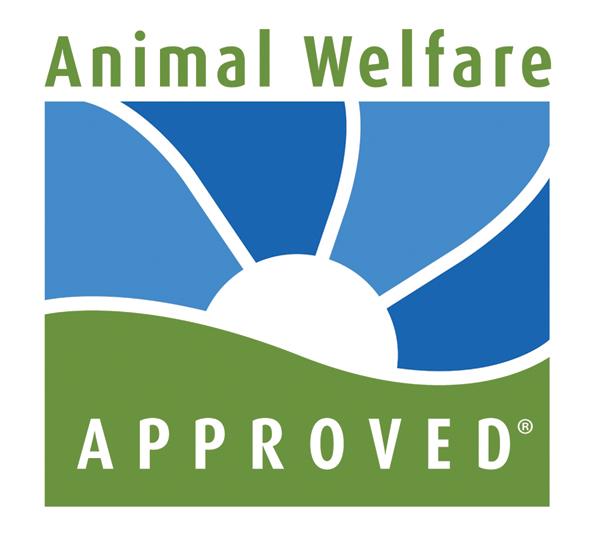 raise their animals according to the highest animal welfare and environmental standards, outdoors on pasture or range. Often referred to as a “badge of honor for farmers” and the “gold standard,” AWA is the most highly regarded food label in North America when it comes to sustainability, animal welfare and pasture-based farming
raise their animals according to the highest animal welfare and environmental standards, outdoors on pasture or range. Often referred to as a “badge of honor for farmers” and the “gold standard,” AWA is the most highly regarded food label in North America when it comes to sustainability, animal welfare and pasture-based farming
According to AWA, it is the only truly pasture-based certification: no cages, crates or feedlots. Audits cover birth to slaughter and slaughter facilities are visited as well as farms on an annual basis. Annual audits are at no cost to farmers.
California Certified Organic Farmers (CCOF)
www.ccof.org
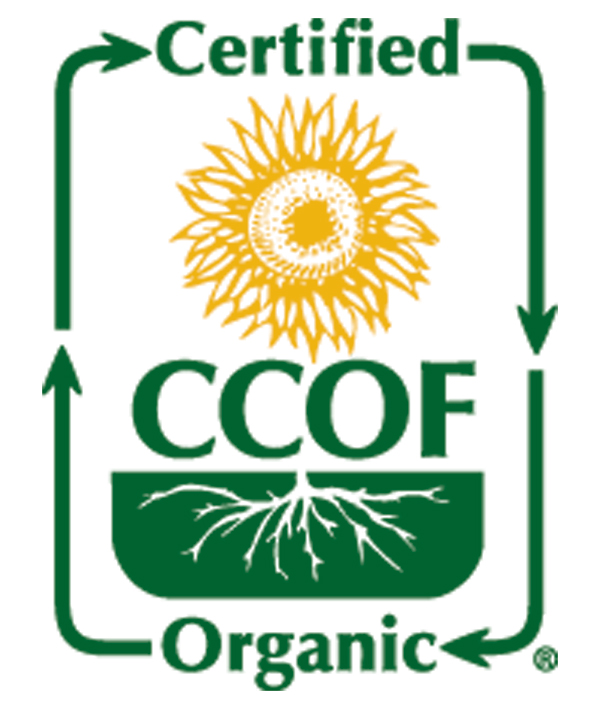 CCOF is a full-service organic certification and trade association providing premier organic certification programs (USDA NOP) and trade association benefits to farms, processors, private labelers, retailers, brokers and more. CCOF advocates on behalf of organic producers, educates consumers and producers and promotes the consumption of healthy, organic foods.
CCOF is a full-service organic certification and trade association providing premier organic certification programs (USDA NOP) and trade association benefits to farms, processors, private labelers, retailers, brokers and more. CCOF advocates on behalf of organic producers, educates consumers and producers and promotes the consumption of healthy, organic foods.
Organic operations become certified following submission and approval of the paperwork needed to explain their production, called the Organic System Plan (OSP), and an on-site inspection. Certification is maintained by updating the OSP, passing an annual inspection and paying an annual certification fee (a range based on gross organic production value).
CCOF provides clients with a large range of unique online services that make certification management convenient. The CCOF seal is one of the most recognized and respected seals in the industry. The use of the CCOF seal on a product guarantees that it has been grown or produced to federal standards, and is backed by the integrity of their organic certifier.
Fair Trade USA, Fair Trade Certified
www.fairtradeusa.org
The Fair Trade Certified label is distributed by Fair Trade USA, a nonprofit organization and third-party certifier of Fair Trade products in North America. Fair Trade USA audits and certifies transactions between companies and their international suppliers to guarantee that the farmers and workers 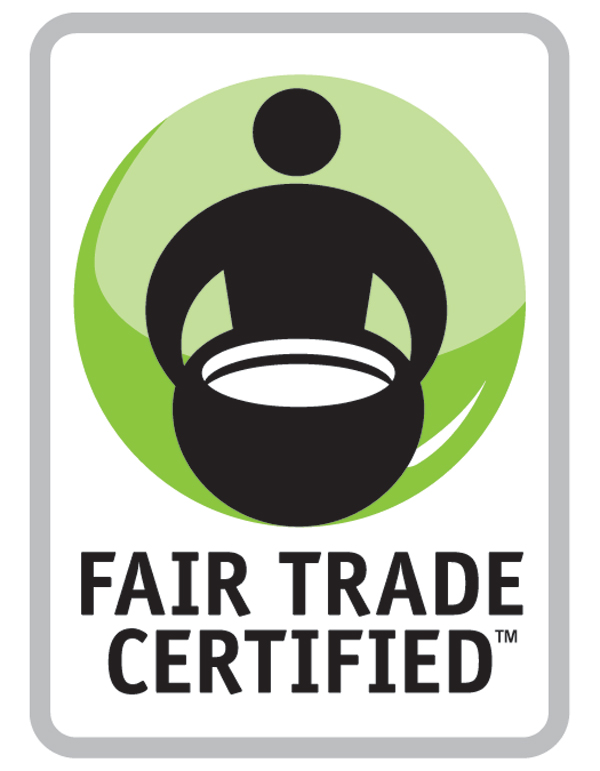 producing Fair Trade Certified goods are paid fair prices and wages, work in safe conditions, protect the environment and receive community development funds to empower and improve their communities. Fair Trade USA also educates consumers, brings new manufacturers and retailers into the Fair Trade system and provides farmers with training and resources.
producing Fair Trade Certified goods are paid fair prices and wages, work in safe conditions, protect the environment and receive community development funds to empower and improve their communities. Fair Trade USA also educates consumers, brings new manufacturers and retailers into the Fair Trade system and provides farmers with training and resources.
While best known for coffee, the Fair Trade Certified label can be found on many products such as tea, chocolate, produce, flowers and even clothing. Fair Trade USA partners with companies to make Fair Trade a viable option for all supply chains and budgets. In 2011, farmers and farm workers earned almost $22 million in community development premiums as a result of increasing Fair Trade awareness and purchases from industry and shoppers.
Family Food Experts, LLC, Kid Kritics Approved Seal
www.familyfoodexperts.com www.kidkritics.com
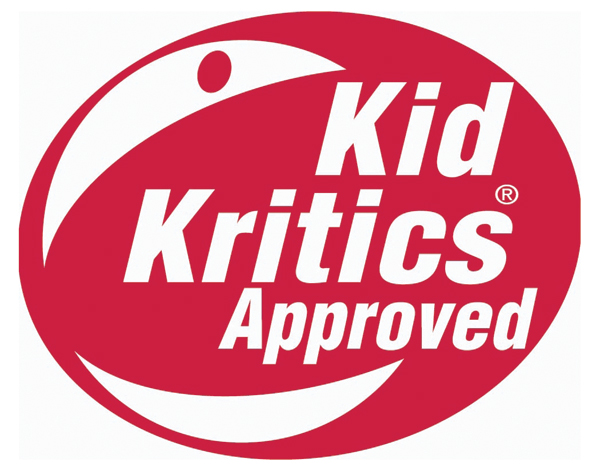 The Kid Kritics Approved (KKA) Seal combines ingredient quality, assurance that kids will like the product and marketing support to aid food manufacturers. Family Food Experts is a trusted source for nutrition information and product selection. Food manufacturers cannot buy trust, but by using the KKA Seal, consumers will identify the following about a product: 1) it was independently evaluated, 2) it has healthy ingredients and 3) kids say it tastes good.
The Kid Kritics Approved (KKA) Seal combines ingredient quality, assurance that kids will like the product and marketing support to aid food manufacturers. Family Food Experts is a trusted source for nutrition information and product selection. Food manufacturers cannot buy trust, but by using the KKA Seal, consumers will identify the following about a product: 1) it was independently evaluated, 2) it has healthy ingredients and 3) kids say it tastes good.
The KKA Seal is awarded to products 1) whose ingredients meet the Family Food Experts, LLC Ingredient Standards set by a board of noted health professionals and 2) that 70% of kids age 5–13 say they would want their parents to buy after a blind taste test. Once a product receives the Seal, KKA aids the food manufacturer in helping moms know what to buy, where to buy it and how to use it. The cost to put three products through the approval process and be marketed for one year by KKA is $3,000. Prices vary based on the number of products in the program. Products are often evaluated within 30 days of contract.
Gluten-Free Certification Organization (GFCO)
www.gfco.org
The Gluten-Free Certification Organization (GFCO) provides customers 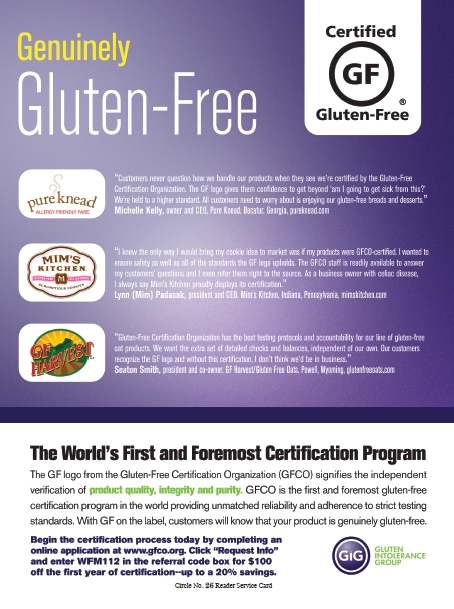 and manufacturers with confidence in a gluten-free food label, as products labeled with the GFCO certification mark meet strict gluten-free standards. Its certification logo helps validate a company’s products, while putting the customer’s mind at ease by reducing the need for constant food label checking.
and manufacturers with confidence in a gluten-free food label, as products labeled with the GFCO certification mark meet strict gluten-free standards. Its certification logo helps validate a company’s products, while putting the customer’s mind at ease by reducing the need for constant food label checking.
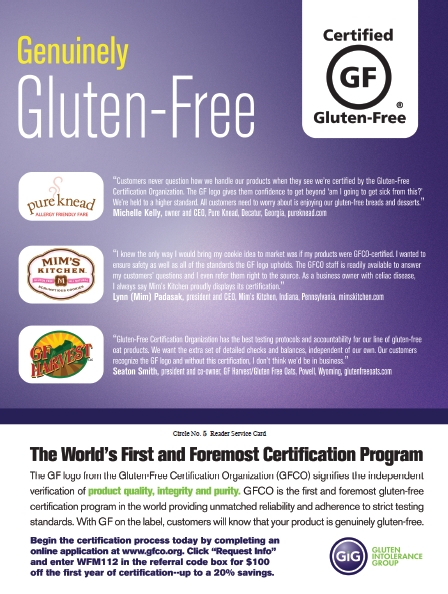 The GFCO ensures a company’s products are safe for gluten-intolerant consumers, supports food manufacturers that provide safe, gluten-free products and educates and trains the food industry on gluten-free related issues. GFCO is a third-party audit program under the guidance of the Gluten Intolerance Group of North America (GIG).
The GFCO ensures a company’s products are safe for gluten-intolerant consumers, supports food manufacturers that provide safe, gluten-free products and educates and trains the food industry on gluten-free related issues. GFCO is a third-party audit program under the guidance of the Gluten Intolerance Group of North America (GIG).
To be certified, a company first completes an application for all of the products it wants considered for certification. Upon review, a quote is determined for expenses, based on the risk assessment for ingredients, along with several other factors. Next, a GFCO auditor will observe the company and depending on that observation, a verified contract is prepared and a certificate is sent.
Upon certification, the GFCO staff forms a working relationship with the companies it inspects by creating customized packages that include marketing assistance and additional consulting. The GFCO takes away the worry for both food companies and customers by holding products to strict inspection standards, based on scientific research.
Humane Farm Animal Care, Certified Humane Raised and Handled
www.certifiedhumane.org
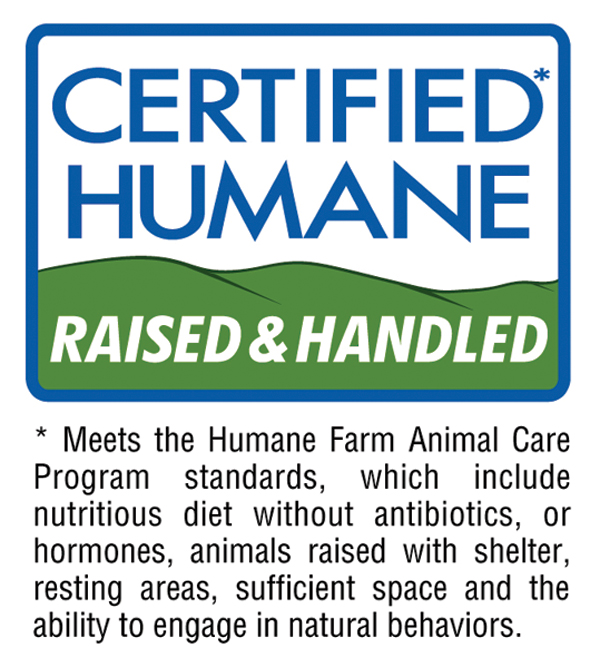 The Certified Humane program has the highest animal welfare standards for farm animals in food production and is endorsed by 44 humane organizations. Certified Humane has the highest recommendation as an Eco-Label from Consumer Reports and is a label consumers find easy to understand. The program has one standard per species, one certification, one label; this contrasts with multiple steps, which can be confusing to consumers.
The Certified Humane program has the highest animal welfare standards for farm animals in food production and is endorsed by 44 humane organizations. Certified Humane has the highest recommendation as an Eco-Label from Consumer Reports and is a label consumers find easy to understand. The program has one standard per species, one certification, one label; this contrasts with multiple steps, which can be confusing to consumers.
The Standards are written by a 25-member Scientific Committee of animal scientists and veterinarians and cover all major farm animal species, as well as poultry and livestock slaughter. Certification requirements include farm inspections, slaughter inspections and traceability audits.
Certification costs are $600/day for inspections (two nearby farms can split the $600 fee if inspected on the same day), and minimal certification fees for products sold (e.g., $0.0001 per egg, and 1/10th of a cent per gallon of milk).
KOF-K Kosher Supervision
www.kof-k.org
An internationally recognized trademark, KOF-K Kosher certification provides 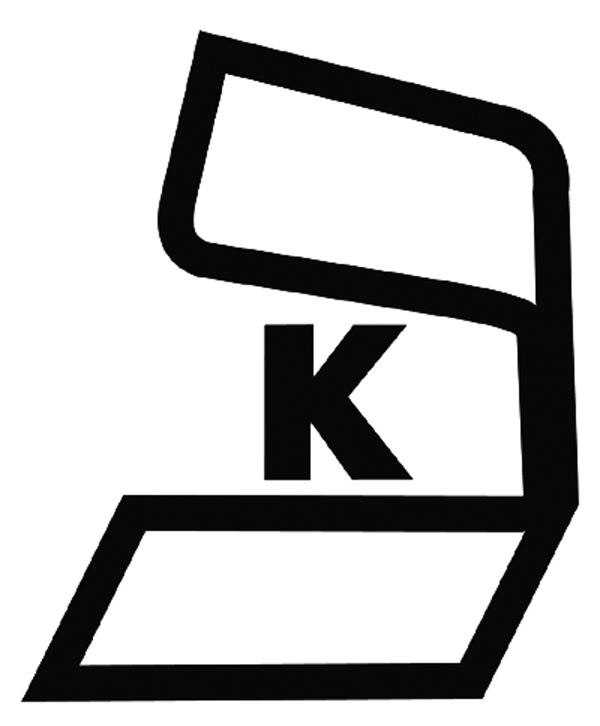 a company several advantages:
a company several advantages:
1. Authorization to print the KOF-K trademark of Kosher certification on its packaging, which is recognized by consumers, both Jewish and non-Jewish, and Rabbinic agencies throughout the world;
2. The superior service for which KOF-K is well-known in the food industry. KOF-K provides rapid and efficient establishment of a Kosher program;
3. Reasonable fees for Kosher certification, as KOF-K has Rabbinic representatives worldwide;
4. A list of kosher food distributors in the United States and Canada.
The following is a partial list of some well-known major brands that are under KOF-K Kosher certification:
|
Mane Flavors |
Bigelow Tea
Breyer’s Ice Cream
Comax Flavors
ConAgra Spices and Flour
Continental Mills Bakery Mixes
Farmland Dairies Milk Products
Frutarom USA Flavors and Gums
Ghirardelli Chocolates
Givaudan Flavors
Good Humor Ice Cream
Joyva Candies
Kerry Batters & Coatings
Marine Stewardship Council (MSC)
www.msc.org
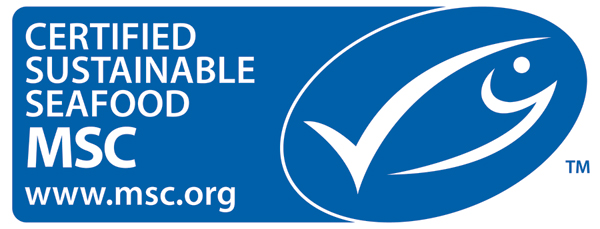 MSC is one of the world’s leading eco-label and certification programs for wild-caught seafood. When buyers and consumers see the blue MSC eco-label, they can be sure that product is traceable back to a fishery that has been certified to the MSC’s rigorous standard for sustainable and well-managed fisheries. The standard ensures that fish stocks are healthy, the impact of fishing on the marine ecosystem is minimal and the fishery is well-managed. Fisheries around the world voluntarily come forward to be assessed against the MSC standard and the open, transparent evaluation process is conducted by an independent, third-party certifier with full stakeholder engagement.
MSC is one of the world’s leading eco-label and certification programs for wild-caught seafood. When buyers and consumers see the blue MSC eco-label, they can be sure that product is traceable back to a fishery that has been certified to the MSC’s rigorous standard for sustainable and well-managed fisheries. The standard ensures that fish stocks are healthy, the impact of fishing on the marine ecosystem is minimal and the fishery is well-managed. Fisheries around the world voluntarily come forward to be assessed against the MSC standard and the open, transparent evaluation process is conducted by an independent, third-party certifier with full stakeholder engagement.
Once a fishery is certified, all companies in the supply chain must have MSC Chain of Custody certification, which ensures MSC labeled seafood can be traced back to a certified source. MSC- labeled products are found in supermarkets, mass merchant chains, drug/nutritional supplement stores, restaurants, universities and other foodservice establishments. Worldwide, more than 17,000 products bear the MSC eco-label and the estimated annual retail value of MSC-labeled products is over $3.2 billion. The MSC eco-label can be found on products in multiple categories.
Natural Products Association (NPA), Natural Seal, Natural Standard
www.npainfo.org
 NPA developed the Natural Seal for personal care and home care products to protect and equip consumers to maximize their well-being. The Natural Standard is a set of guidelines that dictate whether a product is truly “natural.” The Natural Seal is a third-party audited program and requires product manufacturers to complete the application and submit documentation on each ingredient in their product. The Natural Seal not only looks at the source of the ingredients, but also how they are processed. To attain certification, products must be at least 95% natural (excluding water from the calculation). Any synthetic ingredients must make up less than 5% of the whole and must appear on a specific list of allowable ingredients. The total cost of certification is just $500 per product for NPA members, w
NPA developed the Natural Seal for personal care and home care products to protect and equip consumers to maximize their well-being. The Natural Standard is a set of guidelines that dictate whether a product is truly “natural.” The Natural Seal is a third-party audited program and requires product manufacturers to complete the application and submit documentation on each ingredient in their product. The Natural Seal not only looks at the source of the ingredients, but also how they are processed. To attain certification, products must be at least 95% natural (excluding water from the calculation). Any synthetic ingredients must make up less than 5% of the whole and must appear on a specific list of allowable ingredients. The total cost of certification is just $500 per product for NPA members, w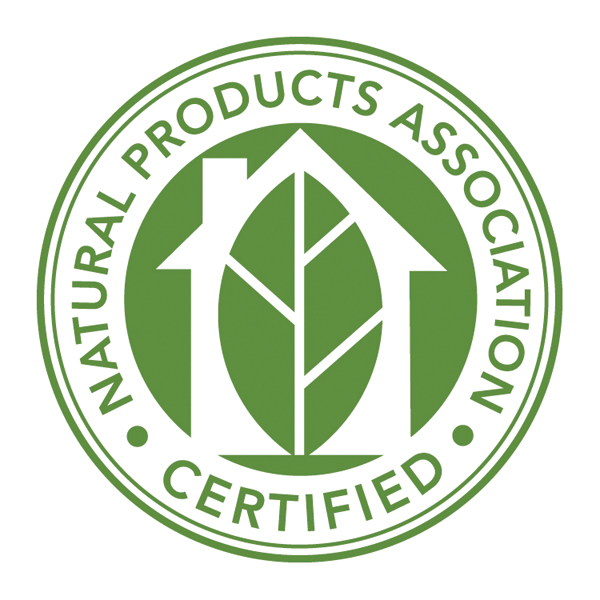 hich includes the cost of the audit as well as use of the Natural Seal for the two-year certification term.
hich includes the cost of the audit as well as use of the Natural Seal for the two-year certification term.
The Natural Standard is a living document and is regularly reviewed by the Natural Seal Steering Committee, a group of retailers, manufacturers and ingredient suppliers. This group regularly reviews the Natural Standard to see how it can be stronger. In 2010, the Natural Seal program moved synthetic fragrances and colorants to the list of prohibited ingredients—a tough move that made the Natural Standard much stronger. The Natural Seal provides clarity and transparency for consumers to know which personal care products and home care products are truly natural.
Non-GMO Project, Product Verification Program
www.nongmoproject.org
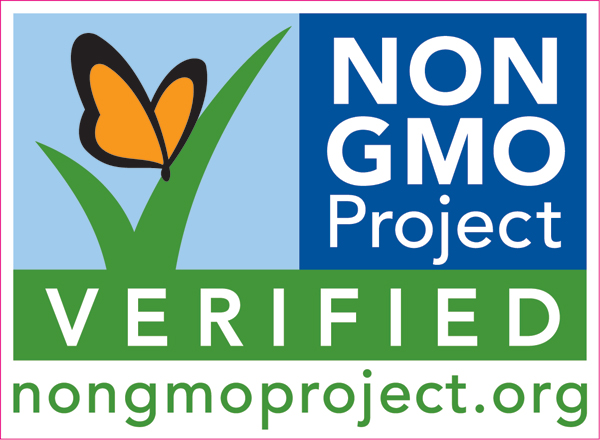
The Non-GMO Project, a non-profit 501(c)3 organization, offers North America’s only third-party verification and labeling for non-GMO food and products. In order for a product to be verified by the Non-GMO Project it must be produced in compliance with our rigorous and comprehensive standard, which is publicly available on our website. The core components of our program are testing, traceability and segregation. We require that every major ingredient derived from a GMO risk crop be tested prior to use in verified products. This testing has to be done on an ongoing basis, and is confirmed through annual audits and onsite inspections. It’s important for shoppers to understand that non-GMO claims are not regulated, so anyone can say “non-GMO” on their product, even if they haven’t done anything to back it up. The Non-GMO Project brings transparency, consistency and rigor to this unregulated area by providing a meaningful seal that people can trust, because everyone deserves an informed choice about whether or not to consume genetically modified organisms.
NSF International
www.nsf.org
NSF Dietary Supplement Certification. NSF International developed the 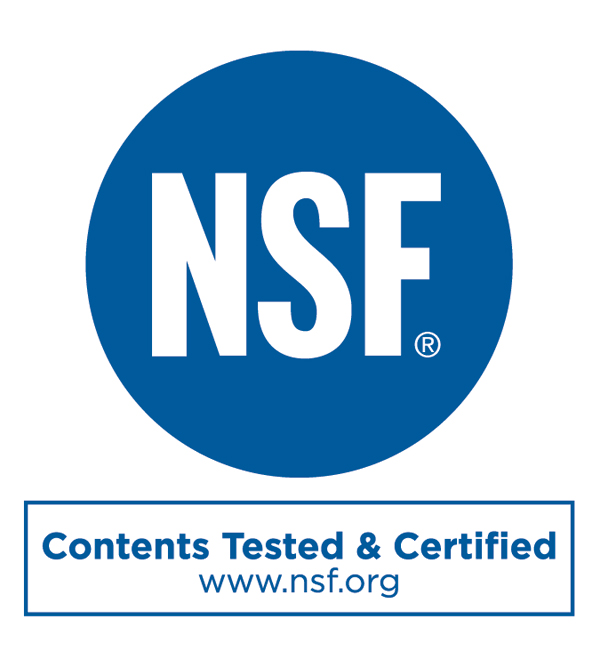 American National Standard for dietary supplements (NSF/ANSI Standard 173) to help protect consumers by testing for contaminants and certifying that NSF Certified supplements contain the ingredients listed on the label and nothing else. The certification process requires label claim review, toxicology review, contaminant review, GMP facility audits and ongoing monitoring to certify compliance through periodic auditing and testing. Products that meet all of these requirements appear at www.nsf.org/Certified/Dietary.
American National Standard for dietary supplements (NSF/ANSI Standard 173) to help protect consumers by testing for contaminants and certifying that NSF Certified supplements contain the ingredients listed on the label and nothing else. The certification process requires label claim review, toxicology review, contaminant review, GMP facility audits and ongoing monitoring to certify compliance through periodic auditing and testing. Products that meet all of these requirements appear at www.nsf.org/Certified/Dietary.
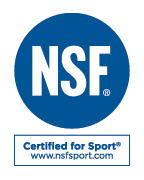 NSF Certified for Sport. NSF Certified for Sport (Athletic Banned Substance Certification program) ensures the supplements and sports nutrition products athletes use are free of prohibited/banned substances. In addition to the NSF Dietary Supplement Certification requirements, the NSF Certified for Sport program requires banned substance testing to screen for more than 165 banned substances and undeclared ingredients including stimulants, narcotics, steroids, as well as unsafe levels of contaminants. Products that meet all of these requirements appear at www.nsfsport.com.
NSF Certified for Sport. NSF Certified for Sport (Athletic Banned Substance Certification program) ensures the supplements and sports nutrition products athletes use are free of prohibited/banned substances. In addition to the NSF Dietary Supplement Certification requirements, the NSF Certified for Sport program requires banned substance testing to screen for more than 165 banned substances and undeclared ingredients including stimulants, narcotics, steroids, as well as unsafe levels of contaminants. Products that meet all of these requirements appear at www.nsfsport.com.
NSF GMP Registration. Good Manufacturing Practices 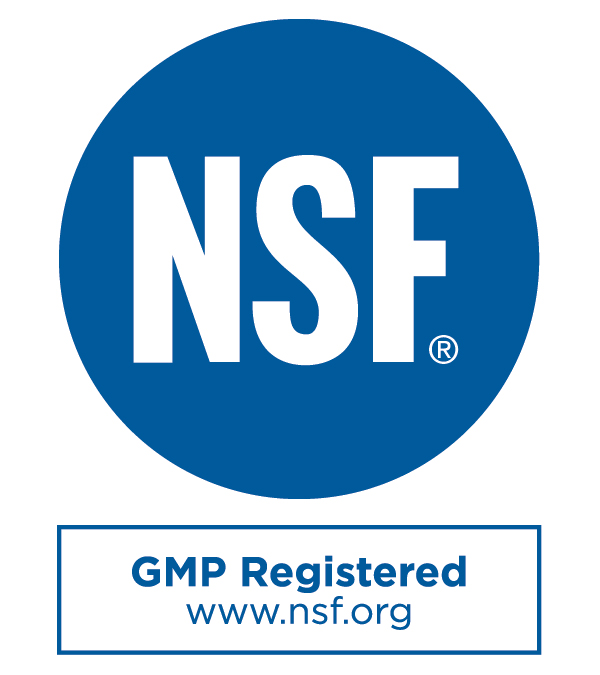 (GMPs) are regulations outlined by the U.S. FDA, which require that the processes by which dietary supplement ingredients are produced are safer and free of possible contamination. This includes all aspects of the manufacturing process, from raw material control to finished product release, as well as employee training, validation of testing equipment, product traceability and facility maintenance. A NSF GMP registration audit verifies whether a company complies with current dietary supplement GMPs. Companies that meet NSF GMP requirements appear at www.nsf.org/Certified/GMP.
(GMPs) are regulations outlined by the U.S. FDA, which require that the processes by which dietary supplement ingredients are produced are safer and free of possible contamination. This includes all aspects of the manufacturing process, from raw material control to finished product release, as well as employee training, validation of testing equipment, product traceability and facility maintenance. A NSF GMP registration audit verifies whether a company complies with current dietary supplement GMPs. Companies that meet NSF GMP requirements appear at www.nsf.org/Certified/GMP.
Oregon Tilth, Inc.
www.tilth.org
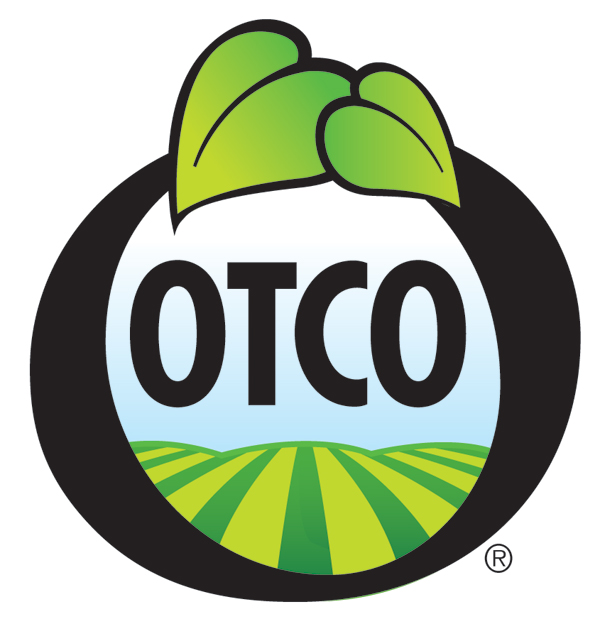 Oregon Tilth is a large and balanced organic certifier; roughly half of its certified operators are farms and the others are processors. This gives Oregon Tilth a unique perspective on the entire supply chain, from seed to table, farm to fork, literally from the ground up.
Oregon Tilth is a large and balanced organic certifier; roughly half of its certified operators are farms and the others are processors. This gives Oregon Tilth a unique perspective on the entire supply chain, from seed to table, farm to fork, literally from the ground up.
Oregon Tilth publishes the bi-monthly journal In Good Tilth, operates the Organic Education Center, hosts the bi-annual Organicology conference in Portland and collaborates with university researchers on sustainable agriculture. It also contributes to research and educational programs linking urban and rural people in the support of a sustainable—and sustaining—course for agriculture and the planet.
Oregon Tilth Certified Organic (OTCO) is an internationally recognized symbol of organic integrity. It certifies to the standard of the USDA National Organic Standard seal, which assures consumers that procedures are authentically organic and meet the stringent standards set forth by the USDA. The certification process for new applicants can take 8–12 weeks from the date OTCO receives the certification application and payment.
Oregon Tilth offers certification services to U.S. and international producers, manufacturers, food handlers and others.
Rainforest Alliance
www.rainforest-alliance.org
The Rainforest Alliance Certified green frog seal is a symbol of 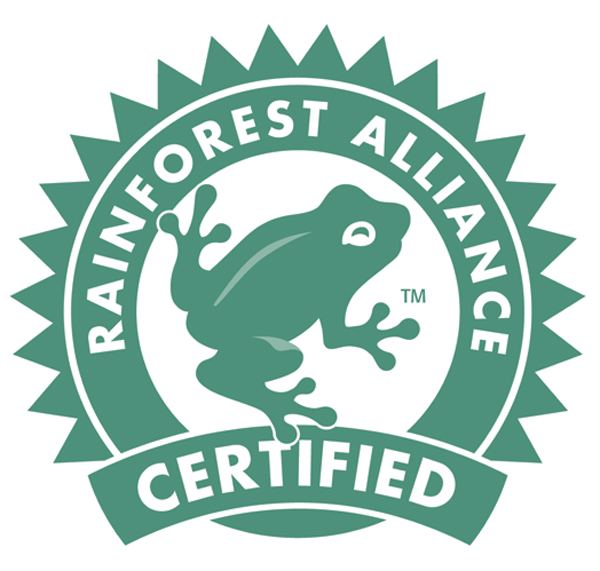 sustainability that can be found on products including coffee, tea, chocolate, fruit, flowers, paper and furniture. By choosing products that feature the seal, consumers support a healthy environment and decent working and living conditions on farms and in forests and their surrounding communities.
sustainability that can be found on products including coffee, tea, chocolate, fruit, flowers, paper and furniture. By choosing products that feature the seal, consumers support a healthy environment and decent working and living conditions on farms and in forests and their surrounding communities.
Rainforest Alliance certification teaches farmers and foresters to manage their land efficiently and responsibly, grow their bottom line and conserve their natural resources for future generations.
To earn the seal, farms and forests must meet the comprehensive third-party standards of the Forest Stewardship Council or the Sustainable Agriculture Network. These standards, developed in collaboration with governments, scientists and businesses, protect animal habitat, conserve soil and water, reduce waste, minimize agrochemicals use and curb deforestation. They also ensure decent conditions for workers and their families.
U.S. Pharmacopeial Convention, USP Verified
www.usp.org
The United States Pharmacopeial Convention (USP) is a scientific non-profit organization that sets standards for the identity, strength, purity and quality of medicines, food ingredients and dietary supplements. It is the only such organization that also offers voluntary verification services to help ensure dietary supplement quality, purity and potency. The USP Verified mark can be found on dietary supplement products stocked in U.S. pharmacies, wholesale clubs, groceries and other retail outlets. It demonstrates a commitment to quality that many consumers find reassuring as they make informed, healthy decisions for themselves and their families.
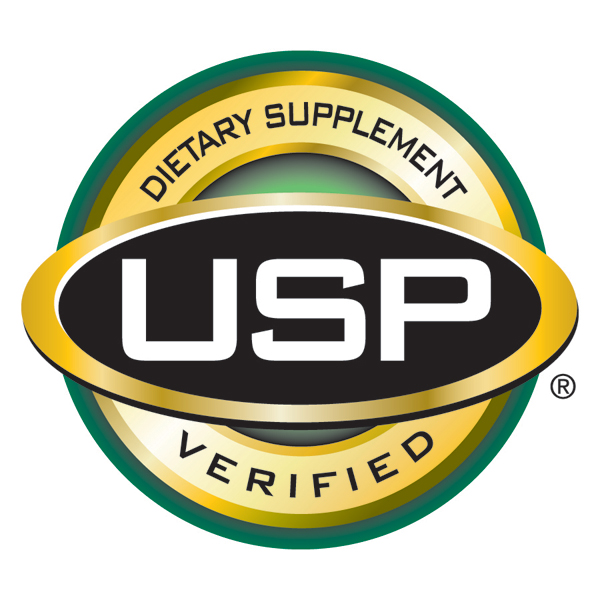 “When you see the USP Verified mark on a label,” explains John Atwater, Ph.D., director of USP’s Verification programs, “it means that the supplement you are buying contains the ingredients listed on that label in declared potency amounts, does not contain harmful levels of specified contaminants, and is produced according to FDA’s good manufacturing practices (GMP) using sanitary and well-controlled procedures. With thousands of brands on the shelves, consumers deserve to know that the products they select have met the rigorous, scientifically proven standards of the USP Verified program.”
“When you see the USP Verified mark on a label,” explains John Atwater, Ph.D., director of USP’s Verification programs, “it means that the supplement you are buying contains the ingredients listed on that label in declared potency amounts, does not contain harmful levels of specified contaminants, and is produced according to FDA’s good manufacturing practices (GMP) using sanitary and well-controlled procedures. With thousands of brands on the shelves, consumers deserve to know that the products they select have met the rigorous, scientifically proven standards of the USP Verified program.”
Published in WholeFoods Magazine, January 2013


